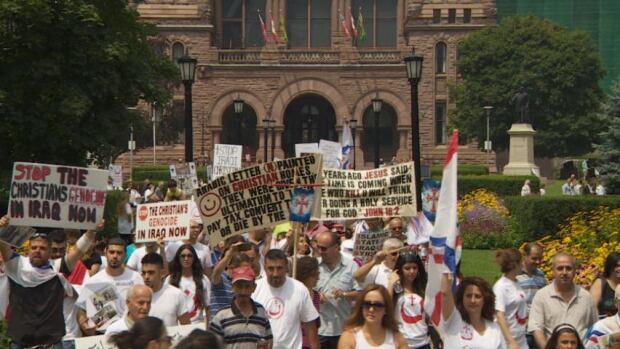
Hundreds gathered at Queen's Park in Toronto today to ask the government for aid and humanitarian intervention regarding the ongoing persecution of Christians in Iraq by militant group ISIS. (CBC)
Hundreds of Iraqi Canadian Christians gathered in Toronto today calling for the government to stand up against the persecution Christians in Mosul have faced since terrorist group ISIS began its occupation on June 10.
The crowd marched around Queen's Park Sunday afternoon.
Many said they had fled Iraq years ago in fear and are now worried about their loved ones back home.
"If I was there right now my options would be to convert, to be killed, pay or to leave," said Roubina Shamoil, a protester born in Mosul.
Shamoil said that news from friends in Iraq is devastating, with tales of people being forced to leave with nothing but the clothes on their back and some young women being taken by ISIS.
"It's really, I have no words to describe the horror stories we hear from there … We need protection, we need humanitarian aid, and we need help."
Since conquering the northern cities of Mosul and Tikrit in Iraq, the Islamic State in Iraq and Syria (ISIS) has become one of the most feared jihadist organizations, seeking to create an Islamic state in eastern Syria and northern Iraq based on Shariah law.
After taking Mosul, the group gave Christians three options: convert, pay a hefty tax or be killed.
Most of the Christians — a minority group in Iraq — have chosen instead to flee, many to a self-ruled Kurdish region.
Iraqi Prime Minister Nouri al-Maliki condemned the group's actions in July, saying that they post a huge threat to the minority community's "centuries-old heritage"

Thousands of Christians fled Mosul, Iraq after being given the options of converting to Islam, paying a tax or death. (CBC)
"What is being done by the Daesh terrorist gang against our Christian citizens in Ninevah province, and their aggression against the churches and houses of worship in the areas under their control reveals beyond any doubt the extremist criminal and terrorist nature of this group," al-Maliki said in a statement released by his office, using the Arabic acronym for the extremist group.
"Those people, through their crimes, are revealing their true identity and the false allegations made here and there about the existence of revolutionaries among their ranks."
Homes that belonged to Christian families were said to be marked with an 'N' symbol — based on the word Nasrani used to describe Christians.
Ashur Eskrya, president of the Assyrian aid society, in Iraq here in Toronto Saturday said that they are asking the government to intervene and send aid.
"To help our people to create a safe haven … for our people to live there," said Eskrya. "…the Assyrian people are the indigenous people of the area."
He said that since 2003 life for Christians has becoming worse and worse culminating in the events of June 10 when ISIS moved in attacking churches, marking houses and ordering conversions.
"At the same time they are attacking other peoples too," he said.
ISIS has strongly targeted and killed Shia Muslims since taking over the region. Just today the group seized two small towns in northern Iraq after driving out Kurdish security forces, further expanding the territories under their control, officials and residents said.
At the end of June the UN said that there was a civilian death toll of 1,531, with 886 security forces killed. They added that 2,287 Iraqis, including 1,763 civilians, were wounded.
Thousands from religiously mixed cities have fled.
Residents in Mosul also say the Islamic State group's fighters recently have begun to occupy churches and seize the homes of Christians who have fled the city.
Iraq's Christian communities date back to the first centuries of the religion. Before the 2003 U.S-led invasion, around 1 million Christians called Iraq home. But since then, the community has been a frequent target for militants, and attacks prompted many Christians to leave the country. Church officials now estimate the community at around 450,000.
No comments:
Post a Comment